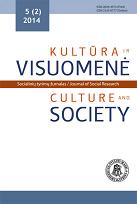Vienišos motinos, vartojimas ir socialinė atskirtis
Lone mothers, consumption and social exclusion
Author(s): Aušra MaslauskaitėPublished by: Vytauto Didžiojo Universitetas
Keywords: Vienišų motinų šeimos; Vartojimas; Socialinė atskirtis; Socialinė klasė; Lone mothers; Consumption; Social exclusion; Social class
Summary/Abstract: Remiantis kokybinio biografinio tyrimo rezultatais straipsnyje analizuojami vienišų išsiskyrusių motinų, auginančių nepilnamečius vaikus, vartojimo ištekliai ir praktikos, galinčios reprezentuoti vieną iš socialinės atskirties dimensijų1. Tyrimas atskleidė, kad skyrybos nebūtinai susijusios su vienišų motinų šeimų ekonominiais nuostoliais ir išteklių vartojimui sumažėjimu. Šiuo požiūriu šeimos, kuriose vyrų indėlis į šeimos biudžetą buvo nedidelis ar nulinis, po skyrybų nepatiria neigiamų pokyčių. Vartojimo atskirtis vienišų motinų šeimose reiškiasi per nerealizuojamus kelionių, būsto gerinimo, laisvalaikio, sporto ar grožio paslaugų poreikius. Vienišų motinų vartojimo praktikos organizuojamos teikiant prioritetą vaikų poreikiams, disciplinuotai planuojant išlaidas ir atsisakant spontaniško vartojimo. Tyrimas parodė, kad vienišų motinų grupė, kuri akademiniame diskurse dažnai problematizuojama, yra nehomogeniška, o šios grupės vartojimas ir vartojimo atskirtis sąlygota socialinės klasės. This article analyzes consumption resources and practices of lone mothers with under-aged children and is based on the results of the qualitative biographical interviews conducted in 2013 in Lithuanian urban areas. Consumption of goods and services constitute one but key dimension of the social exclusion and reflects the degree of access various groups have to the socio-normative way of life. Research proves that single mothers’ consumption resources are not definitely negatively affected by the divorce. They are related to the employment structure of the pre-divorce family and social class of the spouses. Pre-divorce families with unemployed husbands do not experience the significant deterioration of the consumption recourses after the divorce. Consumption exclusion is experienced in the single mother families through the unfulfilled demands for travel, housing improvement, leisure, sports and beauty services. Single mothers’ consumption is organized giving the priority to the child needs, disciplined planning of the spending and maximizing the utility of the recourses. Nevertheless the research proved the diversity in consumption of the single mothers’ group determined by the social class.
Journal: Kultūra ir visuomenė: socialinių tyrimų žurnalas
- Issue Year: V/2014
- Issue No: 2
- Page Range: 13-36
- Page Count: 24

